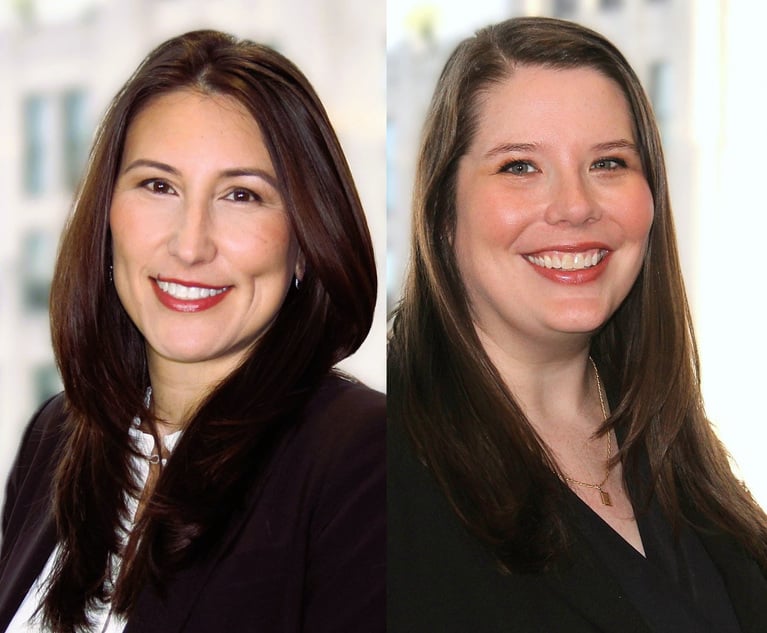Arbitrability of Sexual Harassment and Sexual Discrimination Cases: Litigating in an Alternative Universe
Fissures in the EFAA and FAA have turned matters upside down.
April 15, 2024 at 12:21 PM
6 minute read
 Tanya Tate is a neutral with Miles Mediation & Arbitration in Atlanta. (Courtesy photo)
Tanya Tate is a neutral with Miles Mediation & Arbitration in Atlanta. (Courtesy photo) It is generally understood, or at least it has been in the past, that plaintiffs prefer to avoid the application of the Federal Arbitration Act (FAA) and instead present their cases to juries. As such, plaintiffs have routinely exhausted every avenue attempting to fall outside of the mandates of the FAA. However, the passage of the Ending Forced Arbitration of Sexual Assault and Sexual Harassment Act (EFAA) on March 3, 2022, has put plaintiffs in a quandary and left arbitrators scratching their heads when faced with overseeing a sexual harassment or sexual assault arbitration. Specifically, when does the EFAA apply and when are cases outside of its purview?
The Interplay Between the FAA and the EFAA
The EFAA invalidates arbitration agreements that preclude a party from filing a lawsuit in court that involves allegations of sexual assault or sexual harassment. What makes the EFAA a bit unusual is the fact that lawmakers "embedded" the EFAA into the FAA. Specifically, Chapter 4 of the FAA (which is included in the EFAA) provides that "no pre-dispute arbitration agreement … shall be valid or enforceable with respect to a case which is filed under Federal, Tribal, or State law and relates to the sexual assault dispute or the sexual harassment dispute." "Sexual assault dispute" is defined as a dispute that "involves a nonconsensual sexual act or sexual contact. .including when the victim lacks capacity to consent." A "sexual harassment dispute" is defined as "any conduct that is alleged to constitute sexual harassment." It is worth noting that Chapter 4 also applies to cases that "relate to such disputes." So, the inclusion of the EFAA in the FAA means that parties can only benefit from the protections of the EFAA if the FAA applies.
Questions for Arbitrators When Considering Jurisdiction of These Cases
There are three main questions for arbitrators to ask themselves when determining whether they have subject matter jurisdiction over a dispute submitted to them for arbitration involving allegations of sexual assault or sexual harassment.
Is the Worker an Independent Contractor?
According to Section 1 of the FAA, the only workers that are not covered by the FAA are those with "contracts of employment of seamen, railroad employees or any other class of workers engaged in … interstate commerce." Thus, historically, very few plaintiffs have been able to avoid the application of the FAA as the exemption provided by Section 1 is so narrowly tailored. In 2001, the Circuit City Stores, Inc. v. Adams opinion was handed down, but it did little to expand the exemption, merely adding "transportation workers" engaged in interstate commerce to the already very short list of workers who are exempt from the application of the FAA. Then, in 2019, the U.S. Supreme Court in New Prime Inc. v. Oliveira expanded the scope of the exemption when it held that Section 1 of the FAA applied to independent contractors, hence excluding them from FAA coverage. In reaching this conclusion, high court closely examined the meaning of "contracts of employment." Specifically, the court held that "contracts of employment" referred to agreements to perform work and extended the FAA exemption or "residual clause" to independent contractors. Interestingly, even when a worker argued she had been misclassified, the judge deferred to the employer's classification and found her to be an independent contractor, hence seemingly signaling the court's increasing leaning towards a broader interpretation of the FAA residual clause.
Is the arbitration provision part of a contract, or is it embedded into an employee handbook?
Section 2 of the FAA requires that an arbitration clause be part of a "contract" for the FAA to apply. While many arbitration provisions are set forth in employment contracts, others are sometimes set forth in employee handbooks. Most employee handbooks contain language expressly stating that the policies set forth in the handbook are not intended to create contractual obligations. As such, an arbitration provision set forth in an employee handbook is not part of a contract and accordingly, the FAA does not apply (and so neither does the EFAA). It is incumbent upon arbitrators to be aware of the source of the arbitration provision that governs and confirm that it is "contained in a contract."
Is there a contractual nexus?
Section 2 of the FAA also provides that only allegations arising out of the arbitration contract are arbitrable; or in other words, that there be a "contractual nexus." It is common for an arbitration provision to include language requiring that the arbitration provision applies to "any controversy or claim … arising out of or related to employee's employment with the company." So, the arbitrator must ask whether the dispute that has been submitted to them falls within this category. In evaluating the FAA's contractual nexus requirement, some judges have refused to compel arbitration of an employee's claims against an employer that stem from a co-worker's sexual wrongdoing. These courts have reasoned that "rape does not ordinarily arise out of the employment context." Concerned by this line of cases, and worried that some of these sexual assault and sexual discrimination may not be deemed to have arisen out of the employment context (and therefore not covered by the FAA), some drafters have started crafting language that mandates arbitration for "any controversy."
For instance, in Haasbroek v. Princess Cruise Lines Ltd., the employer mandated arbitration for "all disputes, claims and controversies whatsoever," [emphasis added] also known as an "infinite arbitration clause." Noticeably absent from infinite arbitration provisions is any limitation narrowing the scope of application to only those disputes, claims, or controversies relating to or in any way arising out of or connected with the employee's employment agreement. In Haasbroek, an employee of the defendant employer was raped and impregnated by a co-worker. In arguing that the FAA did not apply, the employee explained that the conduct at issue was unrelated to the arbitration contract since it occurred after hours in a residential section of ship. The court disagreed and found that the conduct, and ensuing dispute, fell within the requirements of the arbitration provision and therefore it compelled arbitration.
Litigating in an Alternate Universe
Thanks to the forgoing, counsel for plaintiffs and defendants who litigate sexual harassment matters are left in in a truly alternate universe. While plaintiffs have historically fought to be excluded from the application of the FAA to avoid compelled arbitration, they now often want to be subject to the FAA so that they can take advantage of the prohibition against forced arbitrations of sexual harassment cases offered by the EFAA. And employers, who have traditionally fought hard to have arbitration compelled, are no longer as adamant in this pursuit since sexual harassment and sexual discrimination claims would likely be excluded from forced arbitration anyway. These fissures in the EFAA and FAA have truly turned matters upside down.
Tanya Tate is a mediator and arbitrator at Atlanta-based Miles Mediation & Arbitration.
This content has been archived. It is available through our partners, LexisNexis® and Bloomberg Law.
To view this content, please continue to their sites.
Not a Lexis Subscriber?
Subscribe Now
Not a Bloomberg Law Subscriber?
Subscribe Now
NOT FOR REPRINT
© 2025 ALM Global, LLC, All Rights Reserved. Request academic re-use from www.copyright.com. All other uses, submit a request to [email protected]. For more information visit Asset & Logo Licensing.
You Might Like
View All

CFPB Proposes Rule to Regulate Data Brokers Selling Sensitive Information
5 minute read
Trending Stories
- 1Inherent Diminished Value Damages Unavailable to 3rd-Party Claimants, Court Says
- 2Pa. Defense Firm Sued by Client Over Ex-Eagles Player's $43.5M Med Mal Win
- 3Losses Mount at Morris Manning, but Departing Ex-Chair Stays Bullish About His Old Firm's Future
- 4Zoom Faces Intellectual Property Suit Over AI-Based Augmented Video Conferencing
- 5Judge Grants TRO Blocking Federal Funding Freeze
Who Got The Work
J. Brugh Lower of Gibbons has entered an appearance for industrial equipment supplier Devco Corporation in a pending trademark infringement lawsuit. The suit, accusing the defendant of selling knock-off Graco products, was filed Dec. 18 in New Jersey District Court by Rivkin Radler on behalf of Graco Inc. and Graco Minnesota. The case, assigned to U.S. District Judge Zahid N. Quraishi, is 3:24-cv-11294, Graco Inc. et al v. Devco Corporation.
Who Got The Work
Rebecca Maller-Stein and Kent A. Yalowitz of Arnold & Porter Kaye Scholer have entered their appearances for Hanaco Venture Capital and its executives, Lior Prosor and David Frankel, in a pending securities lawsuit. The action, filed on Dec. 24 in New York Southern District Court by Zell, Aron & Co. on behalf of Goldeneye Advisors, accuses the defendants of negligently and fraudulently managing the plaintiff's $1 million investment. The case, assigned to U.S. District Judge Vernon S. Broderick, is 1:24-cv-09918, Goldeneye Advisors, LLC v. Hanaco Venture Capital, Ltd. et al.
Who Got The Work
Attorneys from A&O Shearman has stepped in as defense counsel for Toronto-Dominion Bank and other defendants in a pending securities class action. The suit, filed Dec. 11 in New York Southern District Court by Bleichmar Fonti & Auld, accuses the defendants of concealing the bank's 'pervasive' deficiencies in regards to its compliance with the Bank Secrecy Act and the quality of its anti-money laundering controls. The case, assigned to U.S. District Judge Arun Subramanian, is 1:24-cv-09445, Gonzalez v. The Toronto-Dominion Bank et al.
Who Got The Work
Crown Castle International, a Pennsylvania company providing shared communications infrastructure, has turned to Luke D. Wolf of Gordon Rees Scully Mansukhani to fend off a pending breach-of-contract lawsuit. The court action, filed Nov. 25 in Michigan Eastern District Court by Hooper Hathaway PC on behalf of The Town Residences LLC, accuses Crown Castle of failing to transfer approximately $30,000 in utility payments from T-Mobile in breach of a roof-top lease and assignment agreement. The case, assigned to U.S. District Judge Susan K. Declercq, is 2:24-cv-13131, The Town Residences LLC v. T-Mobile US, Inc. et al.
Who Got The Work
Wilfred P. Coronato and Daniel M. Schwartz of McCarter & English have stepped in as defense counsel to Electrolux Home Products Inc. in a pending product liability lawsuit. The court action, filed Nov. 26 in New York Eastern District Court by Poulos Lopiccolo PC and Nagel Rice LLP on behalf of David Stern, alleges that the defendant's refrigerators’ drawers and shelving repeatedly break and fall apart within months after purchase. The case, assigned to U.S. District Judge Joan M. Azrack, is 2:24-cv-08204, Stern v. Electrolux Home Products, Inc.
Featured Firms
Law Offices of Gary Martin Hays & Associates, P.C.
(470) 294-1674
Law Offices of Mark E. Salomone
(857) 444-6468
Smith & Hassler
(713) 739-1250







